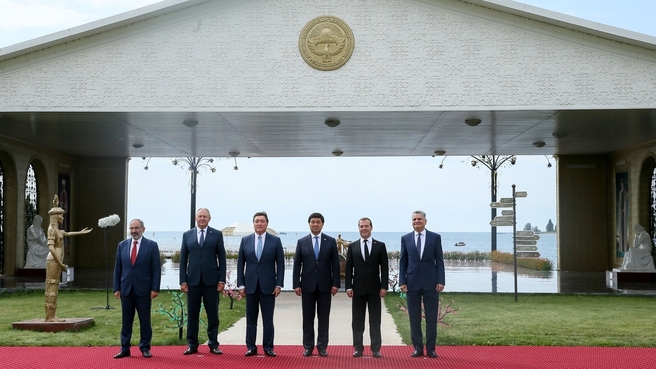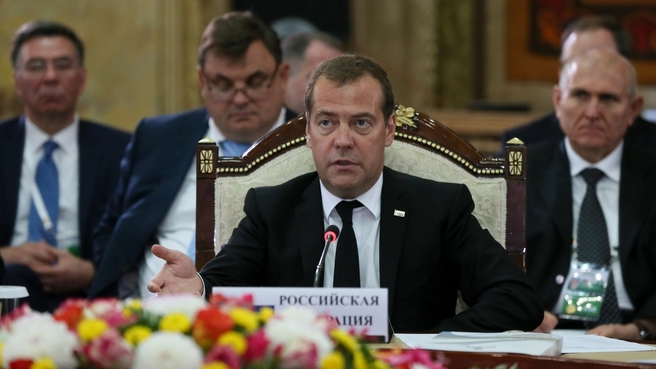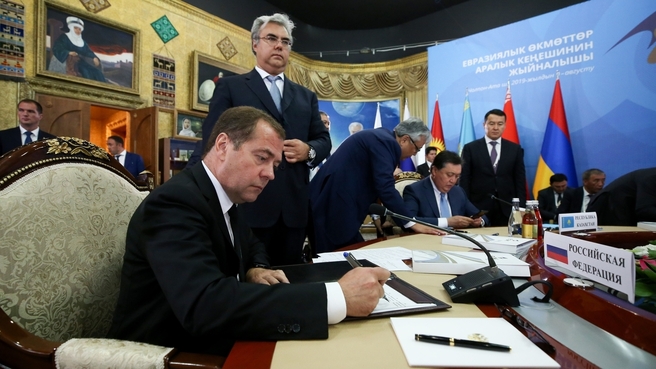Dmitry Medvedev: “Our common goal is to accelerate integration processes within the Eurasian Economic Union, encourage business activity and improve the living standards for the citizens of our countries. There are currently more than 180 million consumers on our common market, and economic indicators are quite robust. In 2018, the aggregate GDP increased by 2.5 percent to $420 billion.”
Dmitry Medvedev’s remarks at the Eurasian Intergovernmental Council meeting
Documents signed following the meeting
Delegation heads taking part in the meeting of the Eurasian Intergovernmental Council:
Prime Minister of the Republic of Belarus Sergei Roumas
Prime Minister of the Republic of Kazakhstan Bakytzhan Sagintayev
Prime Minister of the Kyrgyz Republic Mukhammedkalyi Abylgaziyev
Prime Minister of the Russian Federation Dmitry Medvedev
Deputy Prime Minister of the Republic of Armenia Mher Grigoryan
Chairman of the Board of the Eurasian Economic Commission Tigran Sargsyan
Dmitry Medvedev’s remarks at the Eurasian Intergovernmental Council meeting:
Colleagues, Chairman Nikol Pashinyan, I would like to thank our hosts and personally Mukhammedkalyi Abylgaziyev for the atmosphere that was created for this meeting, and its venue. I hope that this will help us make progress in all areas.
We have already gone through the agenda in the restricted format. There may be somewhat fewer items on today’s agenda, but they are important ones, focused on harmonising operating conditions across markets and promoting international cooperation.
Our common goal is to accelerate integration processes within the Eurasian Economic Union, encourage business activity and improve the living standards for the citizens of our countries. There are currently more than 180 million consumers on our common market. Nothing should stand in the way of people-to-people contacts. We all share this view. While approaches to achieving this vision may vary, overall we all favour establishing a single economic space across almost 20 million sq km. This is an impressive figure that we have to be mindful of.
Economic indicators are quite robust. In 2018, the aggregate GDP increased by 2.5 percent and now exceeds $420 billion. Let me emphasise that I am referring to the aggregate GDP. A wide range of quality goods is available on the common market. Importantly, they are offered at competitive prices. We have just discussed the goods offered by certain other countries, and came to the conclusion that our countries have been cooperating quite effectively, for example, in agricultural production, including fruit and vegetables. There is hardly an alternative to these goods. Entrepreneurs can benefit from an advanced regulatory framework in building their business processes. We are expanding mutual trade in specific categories, including products with high added value, which is extremely important.
We have certain priorities. Just as my colleagues, allow me to outline them.
First, we certainly need to complete our integration architecture. To do so we need to unify the legal framework by adopting a series of supranational acts. There is a roadmap to this effect.
Let me remind you that through its efforts over the past two and a half years, the Eurasian Intergovernmental Council helped eliminate 37 out of 55 economic and administrative barriers, including five this year. Overall, this result is quite positive. Still, no one is happy. Everyone says that we need to move faster. I agree. Every agreement of this kind results from extensive efforts by our countries. The fact that we are able to deliver on this objective is critical.
By the way, the recognition of equivalency between Kyrgyzstan’s veterinary and sanitary control system and Union rules was among the key achievements this year. This creates a completely new environment for our friends from Kyrgyzstan, opening for them the market of our countries.
Second, goods produced, sold within or exported from the Eurasian Economic Union should be subject to the highest quality standards. We have been discussing, including in the restricted format, what these quality standards are all about, who verifies them, and whether they are excessive. In any case, we understand that the integration structure we have created must benefit from the highest quality standards. This refers to protecting the single market from unsafe products. For this reason we continue working on single regulatory requirements and technical regulations. We have just agreed to step up our efforts to improve technical regulations.
This year, the agreement on the traceability of goods was signed. It provides for monitoring the movement of goods from customs to the end user and preventing attempts to engage in any illegal import or distribution operations. We hope that it will be implemented effectively. This system was launched in Russia as a pilot programme on 1 July 2019 for 10 categories of goods.
We continue working on the draft agreement to regulate the alcohol market, and once again devoted much attention to this topic. We hope that we agreed on most of the related matters, and have a common understanding of how to move forward.
Third, we are working on creating a common financial market based on the agreement to harmonise laws relating to the financial market that was signed last year in Moscow. Based on this instrument, we developed an action plan whereby the common financial market is expected to take shape by 2025. I would like to take this opportunity to call on our partners to be more proactive in their efforts and accelerate the ratification of the relevant documents.
Fourth, joint efforts on innovation and high technology are essential. We have launched a large-scale project to build the Eurasian Industrial Cooperation Network to enable our businesses to promote high technology cooperation. Making sure that all segments of this market are digitalised is essential. A lot has been done to this effect: there is a roadmap for developing digital trading platforms, and digital transport corridors are about to be created. The concept of the so-called transboundary space of trust will hopefully materialise, bringing together government agencies, companies and, most importantly, people from member countries. Our next goal is to approve a Concept for Transboundary Information Exchanges.
The fifth point I wanted to make is related to the Agreement Concerning the Transboundary Movement of Hazardous Waste within the customs territory, which is ready for signing. My colleagues have already mentioned this. This topic is very much relevant, and people in our respective countries are eager to know what happens with this waste. This question can no longer be limited to a restricted group of experts. It is relevant for almost all people. This document provides for the introduction of permits for transporting these substances and sets forth the basic principles for exchanging information on abuses and interacting with the competent agencies.
There is another point I wanted to make. Of course we need to further strengthen cooperation with our neighbours within the CIS. We are ready to engage in dialogue with other foreign partners as well. My colleagues have already mentioned factors affecting international cooperation. In fact, talks on free trade are advancing with Singapore, Israel and Egypt. A provisional agreement creating a free trade area with Iran and an agreement on trade and economic cooperation with China will soon come into force, securing advantages for our goods on these markets.
We are committed to working with more partners, including by promoting ties with regional organisations such as ASEAN, MERCOSUR and the Andean Community of Nations. One month ago, the Eurasian Economic Commission signed a Declaration of Partnership with the Pacific Alliance. We support initiatives of this kind, since they offer new opportunities for our countries and their economies. I think that we need to accelerate our efforts to complete procedures for signing free trade agreements with Serbia and Singapore.
Finally, we agreed to hold the next meeting on 25 October in Moscow, alongside the CIS Council of Heads of Government, which is also an important event. I invite all of you to the Russian Federation.
Documents signed following the Eurasian Intergovernmental Council meeting:
· Instruction on the experience in creating supranational companies as part of international integration structures and approaches to creating Eurasian companies
· Directive on the standards for distributing import customs duties among the budgets of the Eurasian Economic Union member states
· Instruction on improving and coordinating draft amendments to the technical regulations on food safety
· Directive on appropriating and distributing import customs duties among the budgets of the Eurasian Economic Union member states in 2018
· Decision on the Concept of Transboundary Information Cooperation
· Decision on the Eurasian Network for Industrial Cooperation, Subcontracting and Technology Transfer project documents
· Agreement on signing the draft Agreement on Transboundary Movement of Hazardous Waste within the Customs Territory of the Eurasian Economic Union
· Directive on joint agricultural development forecasts and the supply and demand ratio among the Eurasian Economic Union member states concerning agricultural products, food, flax-fibre, rawhide and wool in 2019-2020
· Protocol on signing the Protocol to Amend the Treaty on the Unified Board of Customs Agencies from the Eurasian Economic Union member states of 22 June 2011
· Directive on presenting to the Supreme Eurasian Economic Council a candidacy for the Eurasian Economic Commission Board
· Directive on the time and venue for holding the next meeting of the Eurasian Intergovernmental Council












